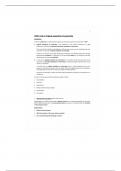Class notes
LPRO 3724 - Original Acquisition of Ownership Notes
- Course
- LPRO3724 Property Law
- Institution
- University Of The Freestate (UFS)
This is a comprehensive and detailed note on Original Acquisition of Ownership for LPRO 3724. Quality stuff!!
[Show more]



